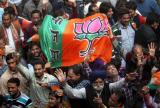Lucknow, Dec 11: Buoyed by the electoral successes in Rajasthan, Madhya Pradesh, Chhattisgarh and Delhi, the state unit of the Bharatiya Janata Party has decided to fast track its preparations for the 2014 Lok Sabha polls.

"The winds of change are sweeping the country and we would like to continue the momentum in UP which sends 80 MP's to the Lok Sabha. Hence, the candidates selection has to be done in the right earnest," a senior leader said.
Former UP chief minister Kalyan Singh said Wednesday that while winnability would certainly be a criterion for selection of candidates and clean image will also be considered.
Predicting that the politics in the country was at a turning point, Singh also pointed out that the BJP would get 50 plus seats in the state which was currently yearning for change under the BJP's prime ministerial candidate Narendra Modi.
"Casteist and other brands of politics would soon be things of the past and development will be the sole mantra," Kalyan Singh said.
Senior party leaders also said that a recce had already been done on some new and fresh faces that would be put up in the Lok Sabha polls.
Party insiders, however, confirmed that there was unanimity in the party to repeat all its 10 sitting MP's from the state. The party has also started coordinating and getting feedback with its various wings and frontal organisations to zero in on prospective candidates.
"Image before the people is very important and we will be considering this as a crucial point of selection in the run up to the final selection" a senior leader said.





Comments
Add new comment